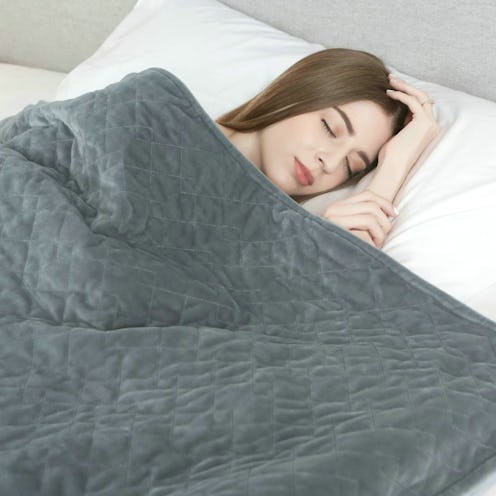Life
This Is How Weighted Blankets Work, According To Science
Anxiety disorders are really, really common. 40 million adults in the United States are currently living with at least one anxiety disorder. Of those with anxiety, only 36.9 percent are receiving treatment. Weighted blankets are a potential treatment for anxiety that has recently gone mainstream. These four to 30 pound blankets used to only be available through a therapist or psychiatrist. Now, anyone can buy one off of Amazon for less than $150, but how do weighted blankets really work?
Weighted Blanket, $143, Amazon
The extra weight of weighted blankets creates a calming effect by pushing the body downwards. This process is known as “earthing” or “grounding.” A study published in The Journal of Alternative and Complementary Medicine examined the biologic effects of grounding on the human body during sleep. Researchers found that grounding the human body to earth during sleep reduced night-time cortisol levels. Cortisol is a hormone released during times of stress that increases heart rate, blood pressure, blood glucose, and muscle tension. Grounding was also found to improve sleep satisfaction and reduced pain and stress in most of the study participants.
Weighted blankets also simulate a deep pressure touch (DPT), which is a type of therapy that uses hands-on pressure to reduce chronic stress and high levels of anxiety. DPT can promote relaxation and trigger the release of dopamine and serotonin. Dopamine and serotonin are naturally occurring chemicals in the brain that help you resist depression, anxiety, and other mood disorders.
While anxiety is the most common reason folks purchase weighted blankets, they are used for other disorders too, including insomnia. Instead of taking sleeping aids, those who suffer from insomnia have found that weighted blankets are helpful when trying to fall and stay asleep. Researchers in one study found that participants using a weighted blanket stayed asleep longer and moved less while asleep. Participants reported that it was easier to fall asleep and they felt more refreshed in the morning after sleeping under a weighted blanket.
But is having a heavier than normal blanket on you while you sleep safe? One study found that weighted blankets are safe and effective in reducing anxiety. Teresa May-Benson, an occupational therapist with the nonprofit Spiral Foundation, told Live Science that weighted blankets are harmless for adults and teenagers, but there have been cases of weighted blankets harming children. An autistic nine-year-old boy in Quebec, Canada, allegedly died after being wrapped in a weighted blanket in 2008, prompting a safety review that suggested these blankets not be used for more than 20 minutes at a time.
Some weighted blanket manufacturers recommend buying a blanket five to 10 percent of your own weight so you can easily toss it off of you when necessary. A medical professional can help you decide the best weight of your weighted blanket before you purchase one, too. Also, keep in mind that blankets made with natural materials are recommended over blankets made with synthetic fibers. Natural materials are more breathable, and synthetic fibers tend to be much hotter, which can make sleep uncomfortable. And that kind of defeats the whole purpose of buying a special blanket.
Like most things designed to make life easier, weighted blankets aren’t miracle products. While research suggests that they can help with anxiety, you should consult your doctor before trying a new therapy. A weighted blanket is not a substitution for an existing prescription or other kinds of therapy designed to alleviate anxiety or insomnia. Many weighted blanket users use them in addition to seeing a therapist and taking medication. It’s important to research the benefits and potential side effects of a product and determine which combination of treatments works best for your particular situation.
